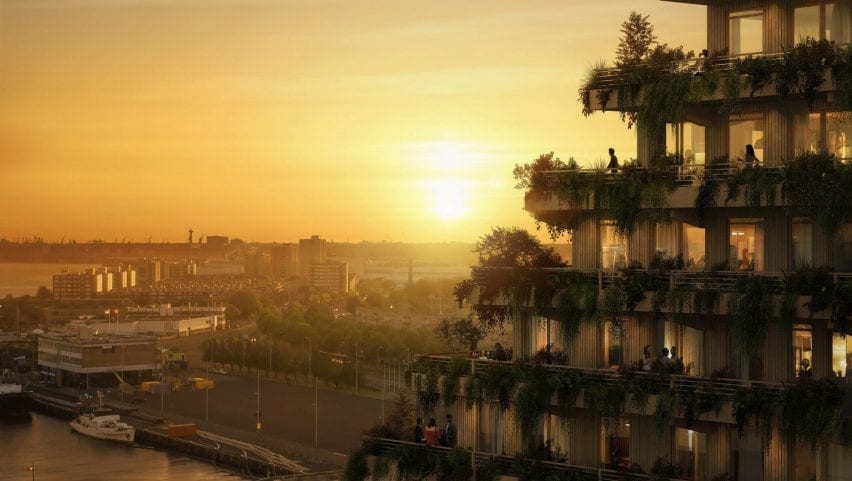Construction of SAWA, Rotterdam's first wooden residential tower, has been put on hold due to a shortage of timber and other construction materials.
Work on the SAWA project, a 50-metre-high cross-laminated timber tower by Mei Architects, has been delayed until September.
"The timber shortage is a problem at the moment," said Harmen Brink, a representative of the project. "The prices of timber are explosively high at the moment, which makes it a bit more difficult."
Described as "the most eco-friendly buildings in the Netherlands," the 16-storey SAWA project will provide 109 homes in the former dock area of Schiemond in Rotterdam.
Over 90 per cent of the wedge-shaped block, including its structure, will be built of CLT using timber coming from sustainably managed forest in Scandinavia. "For every tree felled for SAWA, three trees are replanted," the project's website says.
The project will use 4,500 cubic metres of timber, which will sequester 2,800 tonnes of atmospheric carbon, according to the architect, who claimed the project will be carbon negative.
But Mieke Winkel of Mei Architects added: "To be honest, we do not yet know what the [carbon] impact will be on the total lifecycle of the project. That is being calculated."
Winkel added that the delay was due to more general increases in construction costs, rather than just the timber.
"The project has been delayed somewhat but this is not directly related to the timber shortage in terms of delivery time," she said. "The sharp increase in construction costs in the broad sense has delayed the process somewhat."
The delay follows reports of soaring costs of materials including timber, steel and concrete around the world as construction ramps up in the wake of the pandemic, which disrupted supply chains.
Lumber prices have fallen this month from last month's highs but still remain higher than pre-pandemic levels, the New York Times reported this week.
Timber shortages have been particularly acute in France as architects switch to more sustainable building practices cause a surge in demand in the country, which is also preparing for the 2024 Summer Olympics in Paris.
"The prices are going up every week," Christophe Lemoal of Paris studio Lemoal-Lemoal told Dezeen last month. "We have two construction projects where the wood company can't give us any date for the delivery because they can't find the supply."
The situation in France is made more acute by new laws requiring half of the materials used to construct public buildings to be wood or other biomaterials. The law is part of the country's drive to become carbon neutral by 2050.
Similar laws are being introduced in the Netherlands, with Amsterdam now requiring 20 per cent of new housing to be made of wood.
But Winkel said that Rotterdam's decarbonisation plans lag behind other cities and do not pay enough attention to emissions from the built environment.
"In short, the built environment plays only a limited role in reducing CO2 emissions [in Rotterdam's plans], she said. "The focus is mainly on the existing built environment. Nothing is said about new buildings and nothing at all is said about building in wood."
"From our point of view, this is of course very strange and a missed opportunity," she added.

